- Home
- Barry Unsworth
The Ruby In Her Navel Page 5
The Ruby In Her Navel Read online
Page 5
"Something perhaps scarcely noticed at the time, but coming together afterwards in memory to form a particular significance."
Slowly he turned his face towards me and I saw the smile return and the attempted look of benevolence, which would always be defeated by the needy set of his jaws. "From you it would have great force," he said.
"Who came with evidence of this kind would earn the gratitude of some of the highest in the Kingdom, those able to grant any wish, able to change a man's life with a word, with the stroke of a pen."
My understanding of his meaning had been delayed by disbelief. It came now, leaving no room for surprise but only for rage. This was the urgent matter he had wanted to discuss, this was where that talk of Christendom had been tending. I got to my feet and looked down at him, feeling the rush of blood to my face.
"You dare to ask me to give false evidence against my benefactor? You think my honour so slight a thing?"
"No, no," he said. "I ask you only to search your memory."
He had not moved, which was fortunate for us both: if he had stood to face me, I think I would have struck him, even in holy orders as he was.
"They who set you on did well to choose a priest," I said. "Your cloth has been your protection tonight."
With this I left him sitting there. I threw a coin to the landlord as I went, not wanting to be beholden to Béroul, even to that small degree.
Anger contended with shame in me, though the nature of this shame I could not determine. That I had listened so far? That I had been deemed a fit subject? More questions to plague myself with. Below anger and shame there stirred something of the fear I had felt in the chapel at the news of Demetrius' supplanting. There was a sickness in Béroul that was all his own; his was the blood that was corrupted. But Béroul was no more than a messenger, a lackey. Those behind him would be less concerned with the triumph of Christendom than with the gathering of power into their hands on this our island of Sicily.
Such was the disorder of my spirits that all desire for the women of the Tiraz left me. I went home by the shortest way, heavy-hearted after the rage, with Sara's ringstone still in my purse.
IV
I said nothing to Yusuf about this encounter, and this was the first and perhaps the gravest of the mistakes I made with him. Some of the shame I had felt at the time stayed with me. I was afraid he would think, as I had not been able to help thinking even in the midst of my anger, that I had been singled out as a likely traitor because so I was regarded. And if so I was regarded, perhaps so I was. And truth compels me to admit that a thought had come to me, suppressed at once but piercing nonetheless, when Béroul had spoken of those who have power to change a man's life, there had been a moment when I had thought of my disappointed hopes and my failure to become a knight.
I did not think Yusuf could detect such flickerings of my mind, but I feared he would place less trust in me, that I would lose his regard – and his favour, on which depended my advancement. Frankness then would have saved much sorrow later. But secrecy and suspicion were in the air we breathed, both of us, I was his pupil after all. And I thought it unlikely that the meeting with Béroul would come to his knowledge.
I spent the days before leaving in a way not different from usual. The mornings were passed at my desk in the small room I shared with my clerk Stefanos, and we did the work there that we were accustomed to do. There were accounts to look through that were not entered on the account books of the Royal Demesne, though they could be sent for at any time for the King's scrutiny; monies paid out for information, as rewards and inducements of various kinds, monies used to foment revolt in the Balkans and, more recently, in Germany, where we were hoping to unsettle Conrad Hohenstaufen, one of the King's bitterest enemies, by financing a league of German princes headed by Count Welf of Bavaria, who claimed a better title than Conrad's to the imperial throne. Our King Roger would use force of arms if necessary, but he was the first of his warlike line to prefer the undermining of his enemies by diplomatic means, and to me this was one of the marks of his greatness.
I visited Sara and gave her the garnet and benefited from her gratitude.
I made some further enquiries about the birds I was to purchase in Calabria, though without learning a great deal more than Yusuf had told me. Every year they migrated to the marshes that lie between the sea and the town of Cosenza. They came in the spring, grew long crests for their courtship, and in this heedless time of mating were snared easily by the people of the marshes. All I knew beyond this was the price I was to pay – or at least not to exceed.
On the day following my visit to the King's Chapel a man asked to see me and he was brought in, one of the palace attendants accompanying him. My room was no more than an adjunct of Yusuf's much more spacious quarters, but it was on the other side of the passage and had its own entrance. I insisted that anyone who came asking for me should be required to lay down his arms before entering and always accompanied into the room. This was for the dignity of my office, it was not owing to fear; I was aware that I might have enemies whose names and faces I did not know, but I was strong and quick and I had been trained to arms before coming into the palace service. The man was a trader in a small way, an Italian from the colony at Messina who carried salt and our hard Sicilian grain to Salerno and Naples and cities further north, travelling in all weathers by boat and mule-train, a stocky, grizzled man, no longer young, used to hardship and danger in the pursuit of small profits. He had seen, he said, just west of Benevento, a troupe of dancers and musicians of a kind never seen before, the women half-naked or more than half – he said this with a narrowing of the eye and a droop of the mouth.
If that was the great new thing about them, I told him, he was wasting my time. Did he think the King had not seen women in every stage of dress or undress, right down to nothing but a ring on the finger or a ribbon in the hair? Where was the need for a journey to Benevento when there were a dozen places here in Palermo where women danced and took off their clothes while dancing and did all manner of things besides, Saracens, Jews, Greeks, Italians, singly or in groups, according to taste and the preferences of race and religion?
Undeterred, he continued with his praises. Beautiful women. They could touch the earth at heels and head only, the body arched up like a bow, as if inviting the love of a god. They could make their bellies ripple without strain or effort…
"The dancing girls of Tunis can do as much," I said.
"No," he said, "the bellies one moment smooth, the next moment rolling, while the rest of the body remains still, the face composed, a very amazing thing." The dancers were the women, the men made the music. They were from the east, from Anatolia and spoke a language no one could understand.
He himself spoke the language of cupidity. He was eager to interest me in these dancers, knowing me for the King's purveyor, knowing that if they were brought to the court on his information, he would be well paid. He even found occasion to describe the instruments played by the men, of a very unusual kind, he said, drums the shape of hourglasses with a skin across at both ends, a kind of dulcimer with a neck longer than a swan's, played with a bow that was the span of a man's arms…
He was eloquent, thoughts of coin had silvered his tongue, exalted his fancy too – I did not believe his words about the bow, the span of a man's arms is a very variable measure. However, I was interested in what he had said about the body remaining still and only the belly moving.
The dancers of the Mahgreb could sway the hips to simulate the thrusts of love, but I had not seen any with this ability to concentrate all on the muscles of the stomach. On the other hand, if this man could exaggerate about one thing, he could exaggerate about another. I had in the past been deceived sometimes by accounts of dancers, jugglers, acrobats, and paid out good money for performers that proved to be mediocre at best and not fit for the King's attention. On occasion, he who spoke so well of them was discovered to be in their pay, or even to be one of their number. Certainly
I did not suspect anything like this in the man before me, but there is a saying among Sicilians that while to give your trust is good, to withhold it is even better.
"Well," I said, "they may be all you say and it is true that we have not had Anatolian dancers in Palermo before, but they are in the neighbourhood of Benevento and I am not going there."
"They are travelling people," he said, sensing my interest. "They move here and there. Just at this time they will be following the pilgrims."
"I will keep it in mind." I did not tell him I was soon to leave for Calabria; even when we have nothing to hide, the less said the better – another of Yusuf's precepts. Perhaps he had got wind of it somehow, or perhaps his coming to me at this time was no more than coincidence.
"Here is for your trouble," I said, and I gave him two tari from the stock of coins I keep in a box on my desk. "If we bring the dancers to Palermo you will have more."
He seemed well enough pleased with this. Paying for information, something in which I was well-versed, is always a matter of difficult judgement, no matter what the nature of it. If you are too ready, you are taken for gullible, one who will believe anything; if you are too grudging no one comes forward, it is not worth the trouble, or the risk.
Like so much else in our lives, it is a question of balance.
It was in the interest of balance that later the same day I went into the Kalsa, the Arab quarter that lies south of the harbour, riding as far as the Church of San Cataldo and leaving my horse in the square behind the church at stables I had used before: it was better to go on foot and make sure of being unnoticed when visiting Muhammed ar-Rahman.
Here the streets were narrow and the walls high, and the houses had few windows and those closely barred. I walked with eyes cast down, watching my shoes as they scuffled the dust; to look upwards was painful to the eyes in this late afternoon sunlight that came in dazzling reflections from the whitewashed walls. In this district of Palermo there is nothing to tell you where you are, the streets have no names. But I knew the way to Muhammed's house, I had been there before more than once. There was a small mosque in an open space, a simple mesjid with undecorated stone portals and a narrow portico. Close behind this ran a blind alley with a single door. A bell-rope hung at the side. This was the entrance used by those who wanted to keep their visits private; there was another entrance, on a different street, one with wide gates and armed guards. I heard footfalls beyond the door, there was a brief pause while I was scanned through the eye-hole, then the door was opened to me by the enormous Hafiz, who had lost an eye, in what circumstances I had never enquired, and who acted as cook, chamberlain, food-taster and bodyshield. He led me into the courtyard and there I found Muhammed in the shade of the colonnade, half-reclining on a low couch padded with cushions. I heard some notes of a lute and a woman's voice singing low, but this ceased at my entrance.
I felt immediately grateful for the cool here, after the close heat of the streets. Now that the singing had ceased there was for these few moments, as I advanced at Hafiz's side, only the slappings and tinklings of the water from the fountain, as it fell from the tiled niche into the stone basin and down into the channel below.
Muhammed had begun the process of rising, which dignity and corpulence rendered slow. His skullcap and robe were of an impeccable, luminous whiteness. Perhaps my eyes had been affected by the dazzle of reflections outside, because this whiteness seemed stronger than any colour could be, it seemed to draw to itself all the light in the courtyard and even the light from Muhammed's face, so that as he rose to his feet he looked, for all his bulk, strangely like a figure in some theatre of effigies, where only the dress and accoutrements indicate the nature of the personage. This lasted a few moments only. As I drew near his features were restored to him, the short beard, the dark eyes slanting slightly downward like a melancholy dog's, the high-bridged prow of the nose.
"Welcome," he said. "Thurstan the Viking, welcome to my house."
He spoke to me in Arabic, though he knew also Greek, and I answered in the same language, with the conventional invoking of God's blessing on his house. It was his joke to call me Viking, because of my first name which I think derives from the god Thor, and because I am tall and have blue eyes and fair hair that I wear long. It was also a kind of compliment, or at least I took it for such because he thought of Vikings, in their history of seafaring and raiding and settlement, as being a people similar to the Arabs. It was a joke, as I say, but there may have been truth in it; I was born in the township of Norton, close by the River Tees, and that is country where the Danes settled in great numbers in times past, so much so that all that eastern part of England is still known as the Danelaw.
Muhammed made a gesture towards a narrow alcove within the colonnade, where there were low benches against the wall, in the angle of the corner. We sat here facing each other, he against one wall and I against the other.
"You have come on foot, the last part of the way, yes?" he said. "It is hot in the streets, this year the hot weather has come early." He leaned forward and clapped his hands together lightly. "You will take a sarba?"
Hafiz appeared as if by magic. I saw now that he had been waiting out of sight but very close, just inside the arch that led from the courtyard into the interior of the house; from here he could keep us both under his eyes.
I took care to show no haste in accepting this: the alacrity thought courteous by the Franks and the Greeks seems lack of dignity to an Arab.
In fact, I was thirsty after my walk and I remembered Hafiz's sherbet as being particularly good, with just the right mixture of pomegranate and lemon. Nothing much was said as we waited; Muhammed was much too polite to enquire into the purpose of my visit, and I wanted to avoid the appearance of haste.
Hafiz served the sherbet in our full view, pouring from a stoneware jug into the metal cups, making it plain we both drank from the same vessel, a notable piece of hospitable reassurance. When he had again retired, and after some compliments on the quality of the sherbet, I began.
"Yahuda Mari came to us with a complaint some days ago."
"Yes?"
"He came in person."
"I see, yes, a serious matter." Nothing had changed in Muhammed's face.
"There is a complaint that some Jewish cemeteries have been broken into during the hours of night and damage done to the graves."
Muhammed made a brief humming sound, perhaps to show interest or perhaps merely to encourage me in my narrative. He was leaning back comfortably against his cushions.
"Following upon this there is the further complaint that members of the Jewish community have had money extorted from them under the threat that their family tombs will be desecrated if they refuse to pay. According to Yahuda this has been going on for some time, but the people were too much afraid of injury to come forward."
Muhammed nodded, with a full appearance of understanding. "That is often the reason for silence."
After a moment's pause, in a tone I took care to keep dispassionate, I said, "It seems that these threats come from Arabs."
"Do they say that? Surely Yahuda himself has not been threatened?"
"Of course not." He was prevaricating now, and he knew that I knew this.
The Mari were an ancient and powerful family with their main strength in Marseilles but with trade connections throughout Italy. Yahuda was the leader of the Palermo Jews, a man of great wealth. "Who threatens Yahuda?" I said. "We do not threaten the strong but the weak."
"My Viking, you speak with the simplicity of youth. When you have fullness of years you will know that the strongest are those that can be threatened most, because they have most to lose."
"He came to speak on behalf of his people. And it came to the attention of our diwan because no taxes or dues are paid on sums deriving from extortion, and so there is a possible loss of revenue to the Crown.
There is also the question of preserving harmony between races and religions. Yusuf ibn Mansur, who sends h
is warmest greetings and God's blessing upon you, asked me to seek your advice because of the close friendship that is known to exist between us."
I was not sure how close it was, nor whether it could truly be called friendship. The fact was that I had recently been able to do a favour for Muhammed. The porters that loaded the grain for North Africa on the docks of Palermo were all Saracens. The occupation was handed down from father to son and it was profitable – a certain amount of the grain never reached the holds of the ships, never left Palermo in fact, but was sold by private contract. There was also a considerable trade in hashish from the ports of Tunis and Susa. All this being so, these porters were greatly envied by others working on the docks, and from time to time attempts were made to break in, especially by the Sicilians, who lived close by, but also sometimes by the Greeks. This resulted in bloodshed and feuds and all manner of evils. Some months previously, after protracted effort and with the support of Yusuf, I had succeeded in obtaining a charter from the Curia Regis granting exclusive right to the Saracens to engage in the loading of grain to North Africa, thus giving the force of law to what had previously been sanctified by custom only. Muhammed, whose people controlled the porters and extracted from each a monthly contribution, had been grateful.
"You did well to come to me," he said now. "However, it is not my people who have done this."
This might have been true or it might not; I had no means of knowing. If true, it meant that there was a band of Arabs in Palermo acting without his authority, a thing that could not have been pleasing to him. "I fully believe you," I said. "You are a man of honour, I know you would not, simply for the sake of a handful of dinars, so deeply wound the religious feelings of another race."
"Thank you, I am honoured by your trust. This is a very serious matter."
"So it is."
"It is not just a handful. Think of the number of Jews living in this city and the number of the dead in their graveyards."

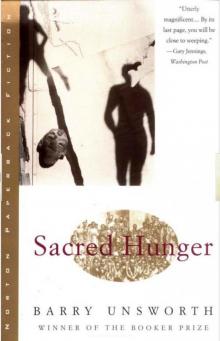 Sacred Hunger
Sacred Hunger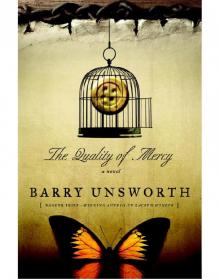 The Quality of Mercy: A Novel
The Quality of Mercy: A Novel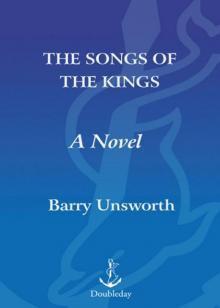 The Songs of the Kings: A Novel
The Songs of the Kings: A Novel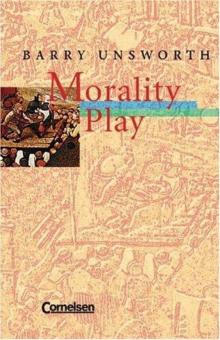 Morality Play. Mit Materialien. (Lernmaterialien)
Morality Play. Mit Materialien. (Lernmaterialien)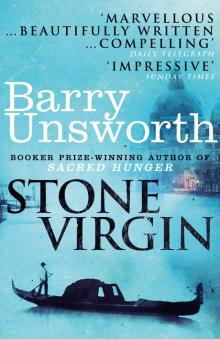 Stone Virgin
Stone Virgin Land of Marvels
Land of Marvels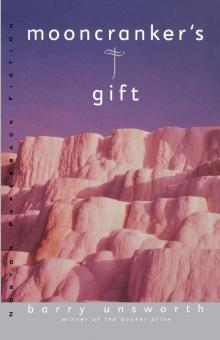 Mooncranker's Gift
Mooncranker's Gift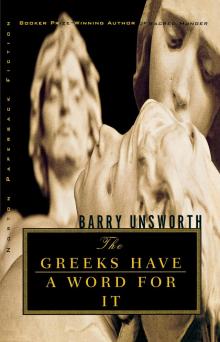 The Greeks Have a Word for It
The Greeks Have a Word for It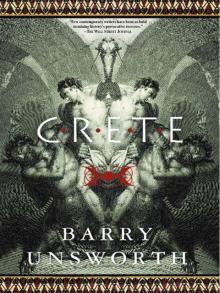 Crete
Crete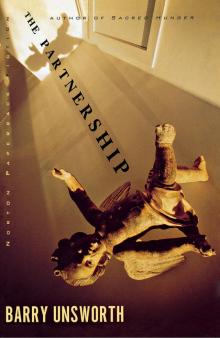 The Partnership
The Partnership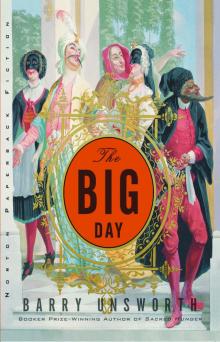 The Big Day
The Big Day The Hide
The Hide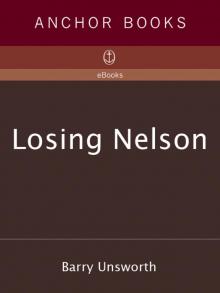 Losing Nelson
Losing Nelson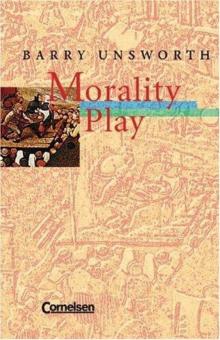 Morality Play
Morality Play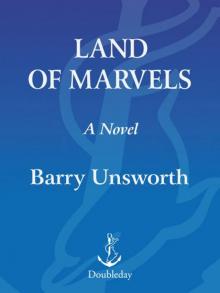 Land of Marvels: A Novel
Land of Marvels: A Novel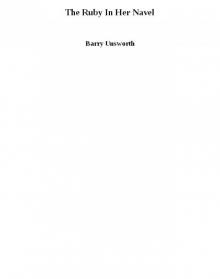 The Ruby In Her Navel
The Ruby In Her Navel